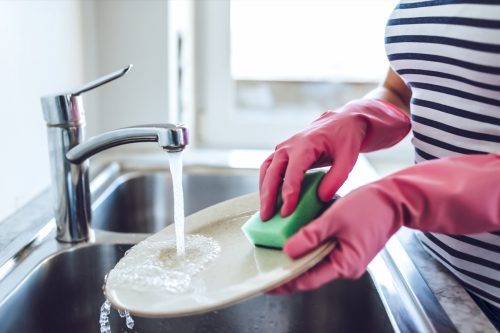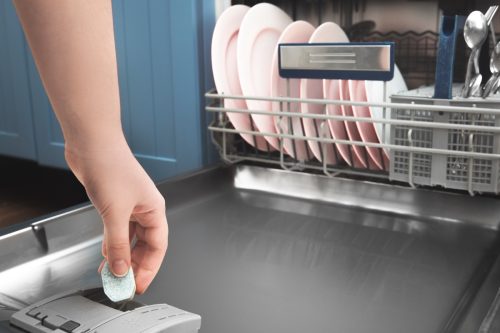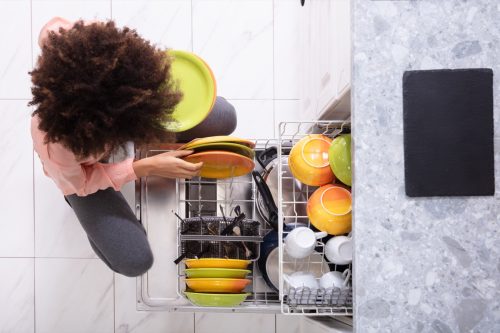Never Do This Before Loading Your Dishwasher, Experts Say
This is probably why your dishes are still dirty after you run them through the washer.

When your dishes pile up in the sink, tackling them all can feel like a daunting task, even if you have an appliance that does the hard work for you. But in truth, loading the dishwasher is actually much easier than you realize. If you're dreading cleaning off last night's dishes, know that experts say there's one step you should always skip when transferring your pots and pans from the sink to the dishwasher. It's a waste of time, energy, and resources, yet as many as four out of five people do it, according to The New York Times. To make sure you're not doing this wasteful task, read on.
RELATED: You Should Never Clean Your Toilet With This, Experts Warn.
Never pre-rinse your dishes before loading them in the dishwasher.

It's probably second nature to you to do a quick pre-rinse of your dishes before slipping them into the dishwasher, but experts say you shouldn't bother. The New York Times estimated that anywhere from 65 percent to 80 percent of people waste their time, money, and resources performing this unnecessary step, but, as the paper pointed out, modern dishwashers and detergents are "designed to clean dishes that are actually dirty." They added that "when you skip the pre-rinse, you'll save a bunch of water, energy, and effort."
The New York Times reports that every dishwasher company, detergent company, and expert they talked to agreed that pre-rinsing is unnecessary. Researchers even did their own tests multiple times with 17 different dishwashers across multiple price ranges. They loaded the dishwashers "with some of the crustiest, most stubborn food stains" with zero pre-rinsing, and "they almost always did a fantastic job."
Pre-rinsing may cause your dishes to not get fully clean in the dishwasher.

Dean Davies, cleaning and organization expert at Fantastic Cleaners, says that pre-wishing your dishes may actually cause them to be less clean after a dishwashing cycle. "Most dishwashers have sensors that detect how much dirt is coming off your dishes and thus adjust the washing," he told Best Life. That means if the sensors detect that your dishes didn't need much attention because you pre-washed them, they may not come out as clean as you hoped.
"If you pre-rinse your items, the dishwasher might think your plates, cookware, and other items are 'clean' when in reality, they need proper cleaning," confirms Alex Varela, the general manager of Dallas Maids. If this happens, Varela says your dishes can "come out dirty or soapy, and you'll have to waste even more water doing the process again."
Not only does your dishwasher do the work for you, so does your detergent. "Most cleaning detergents contain enzymes that help break down gunk and food debris by sticking onto them," said Davies. However, if you're scrubbing away any debris on your dishes, it may make your detergent less effective. "When you pre-wash dishes, the enzymes in the dishwashing tablets don't have something to stick to, and the outcome is half-cleaned dishes," he said.
RELATED: 40 Percent of People Only Wash This Clothing Item Once a Year, Survey Says.
Pre-rinsing also wastes water.

Pre-rinsing dishes and then also using water to run the dishwasher is a big waste of one of our most precious resources. The National Resource Defense Council reports that the average dishwasher uses only three to five gallons of water per load, while the process of washing by hand uses about 27 gallons of water and double the amount of electricity to wash the same amount of dishes.
According to the detergent brand Finish, pre-rinsing dishes can waste up to 20 gallons of water, which is why the company is asking people to "skip the rinse" to help save up to 150 billion gallons of water.
RELATED: For more up-to-date information, sign up for our daily newsletter.
Loading your dishwasher properly can also help ensure it does its job.

Avoiding pre-rinsing your dishes can help ensure that your dishwasher does the best job it can, and there are a handful of other ways to make your dishwasher more efficient, too. Whirlpool Kitchen's Katie Sadler advises you to place dishes with the dirty side facing the center of the dishwasher angled toward the jet.
Sadler also says that you should never overcrowd the dishwasher because it can make it difficult for the jets to spray each item.
And while knives should be placed downward to avoid poking yourself when unloading them, forks and spoons should be positioned handle side down to ensure proper cleaning.
RELATED: 20 Things in Your Home You Didn't Realize You Should Be Cleaning.





















